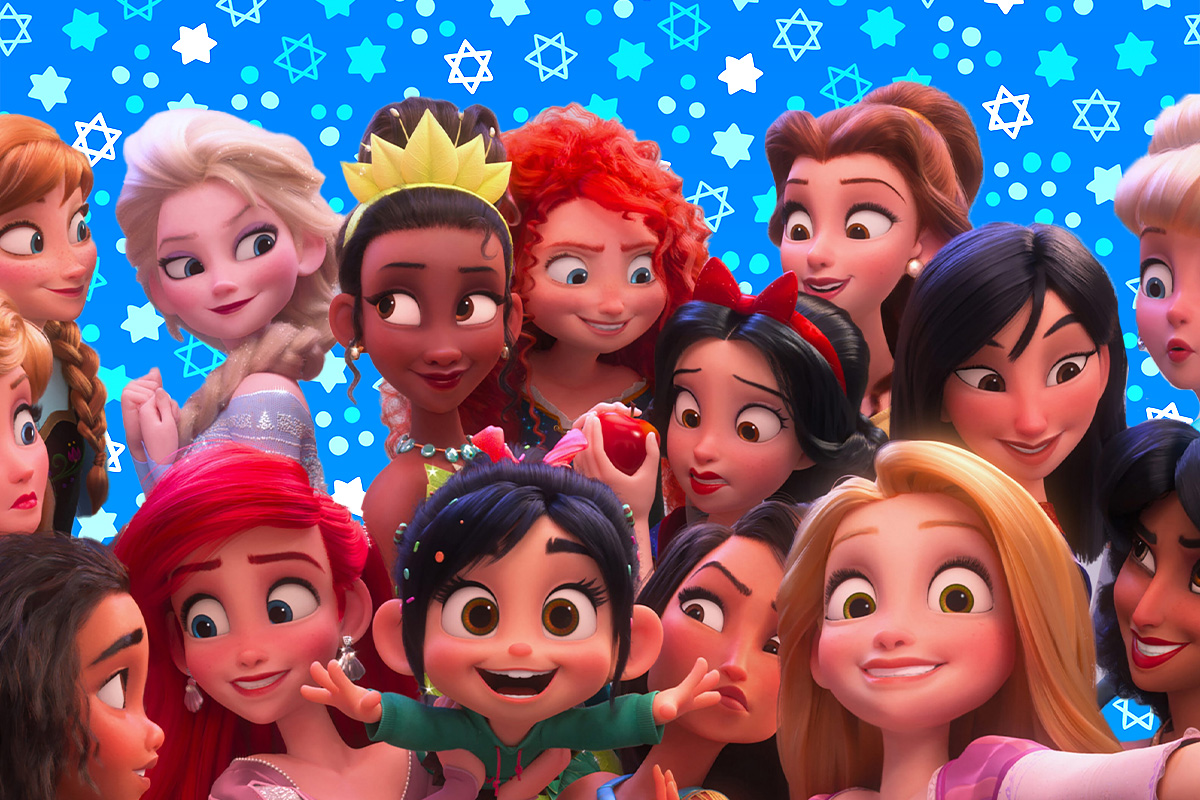As a lifelong and — let’s be honest — downright obsessed Disney fan, I have consumed every film and every show about the Disney princesses. From the more mainstream films, such as “Moana” and “Mulan,” to the more obscure Disney Junior episodes, like when a Jewish Latina princess appeared on a Hanukkah episode of “Elena of Avalor,” I have been there, popcorn in hand, loving every moment of the increasingly diverse canon of Disney princesses.
But I cannot help but notice the severe lack of Jewish representation — especially as main characters.
Even the few Jewish characters that exist in Disney media are usually only alluded to as being Jewish in one episode or a quick scene, such as Ron Stoppable in the bar mitzvah episode of “Kim Possible” or Kronk in “Kronk’s New Groove.” In fact, the lack of authentic Jewish representation has been so pervasive for so long, that many people — including Sarah Silverman, the voice of Vanellope von Schweetz in “Wreck-it Ralph” — have even tried claiming that Vanellope is the first Jewish Disney princess, despite no evidence of her heritage in the film. Though I want Vanellope to be the first Disney princess as much as Sarah Silverman, there is simply not enough proof to fully claim her. Even if Disney did officially release her heritage as Jewish, there is still no evidence in either of the two films she stars in. Once again, Jews would be given breadcrumbs for representation.
However, Disney did get close with the inclusion of Princess Rebecca on “Elena of Avalor.” This was a huge win for Jewish representation because the focus was on her, her family, and her connection to Judaism. However, how many children have rewatched this single episode — or even saw it all — and how many adults even know it happened? Though it is a wonderful step in the right direction, Disney must feature a Jewish Disney character as the protagonist of their own story — not guest-starring a single time on another character’s show.
Disney also has a responsibility to feature Jewish characters in their animated films because of the company’s antisemitic history.
In 1933, Walt Disney released a short film called “The Three Little Pigs,” which tells the classic American tale of the three little pigs and their foe, the big bad wolf. The reception of this short film was extremely enthusiastic, and the short film did so well that it received the 1934 Academy Award for best short film. Additionally, in 2007 it was selected for preservation in the United States National Film Registry because it was deemed significant to American cinematic history.
However, there is one shockingly antisemitic scene that everyone seems to have forgotten.
During the wolf’s continued hunt for the three little pigs, the wolf attempts to trick the pigs by using a disguise. Donning a ‘Jewish peddler’ outfit, putting on a Yiddish accent, and wearing a fake large nose, the wolf attempts to trick the pigs into trusting him so that he can eat them. Yikes. Not only does the wolf have the overt antisemitic hallmarks of a large nose and a fake Yiddish accent, the context in which the wolf is dressed as a Jewish peddler paints Jews as sinister and conniving, doing whatever they can to get what they want — another classic antisemitic trope.
Sure, it can be said that this no longer reflects the current Disney company, but the scene is still antisemitic and has not been clearly recognized as such. Only 15 years ago it was praised again by being selected for preservation!
It should be mentioned that there were later efforts to change the wolf’s Yiddish accent to something less offensive – a clear attempt to silently ‘correct’ the mistake. However, this seems cheap to me. Instead of openly acknowledging the antisemitic scene and promising to do better in the future, Disney attempted to rewrite history. The way I see it, Disney had the choice to call themselves out. This is the minimum needed to apologize. To move on from the past, however, Disney needed to properly and non-offensively portray at least one explicitly Jewish character. The good news is that it isn’t too late! Sure, 89 years seems like plenty of time to at least do one of those things, but I firmly believe that it is better late than never.
Until then, many Jewish Disney fans, including myself, will continue to feel slighted and dishonored by the company we love so much. We have seen blatant antisemitism with almost no move on Disney’s part to condemn it (with a small exception being the PewDiePie controversy). We have rarely seen ourselves in Disney characters and if we did, their Jewishness was only mentioned in passing or in small scenes. We feel more than disparaged — we feel forgotten. Not only do we have little positive representation, but our negative representation has been forgotten as negative! With all of this, it is easy to lose faith in Disney.
But I believe there is still time to fix this, and the answer is incredibly easy: a Jewish Disney Princess.
In my opinion, companies as old as Disney will have less than glowing representation at some point in their cinematic history, but what the current company decides to do to prove their evolution into a more inclusive company is what really matters. The proof is in the pudding and Disney has made no attempt to feature a Jewish Disney character in a title role.
The Disney Princess franchise is arguably the most profitable, or at least most famous, component of the Disney company. Everyone knows Snow White, Cinderella, and Ariel. Children dress up as the princesses for Halloween or at the Disney Parks. Countless products for adults and for children feature the Disney Princesses. Basically, once a Disney Princess is created, she is never forgotten. If Disney created a Jewish Princess film, or Princess-adjacent film such as the popular “Encanto,” then Jewish culture could finally take center stage after literally decades of negative or minimal representation.
The best way to fight hate is with pride. So, to go from an insensitive short film to a proud Jewish feature-length film is the best way to fight antisemitism and prove the company’s evolution towards inclusivity.
I don’t want to run from the problem; I want to address it head-on. I want a film that is unapologetically Jewish and not afraid to be so. I want a film that represents every diasporic group, perhaps functioning similarly to “Encanto,” with characters who are Sephardic, Ashkenazi, Mizrahi, Ethiopian, and so on. I want a film that finally gives Jews a moment in the sun — something so incredibly rare outside the realm of Holocaust cinema. And honestly, I want to dress up as and buy merchandise for Jewish characters! (Disney, I think you underestimate how much cash I would drop if you released a Jewish animated film!)
I love Disney with all my heart, and I know how important Disney films are for children (and for adults!). In times of continuously rising antisemitism and considering the antisemitic history of Disney itself, the best and by far most meaningful action Disney could take is by centering Jewish characters in a feature-length animated film.



